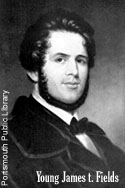|
FRESH STUFF DAILY |
|
|
||
|
|
||
|
|
||
|
SEE ALL SIGNED BOOKS by J. Dennis Robinson click here |
||
Forget the Grinch and Mr. Scrooge. The meanest cheapest man in the world is – or was – Lot Skinner. He was so cheap he would bite a raisin in half when weighing out a pound. Portsmouth-born poet James T. Fields went on to make his fortune in Boston. One has to wonder if Lot Skinner was fashioned on the owner of a Portsmouth grocery store.
MORE Seacoast Poetry
LOT SKINNER’S ELEGY LOT SKINNER was the meanest man When he was in the grocer line, Day in and out, through heat and cold, He never gave a dime away, Of counterfeited bills he used The poor came round his counter's edge, 'T is little things that make a pile," -- He had but one book in the house, He welcomed in the rising moon,' -- He liked in other people's pews Sometimes we saw a greenish smile At last it cost so much to live, -- Now, having gone where all his means Adieu! thou scrap of lifeless clay! Reprinted in Poets of Portsmouth, 1865 Please visit these SeacoastNH.com ad partners.
News about Portsmouth from Fosters.com |
| Thursday, April 18, 2024 |


|
Copyright ® 1996-2020 SeacoastNH.com. All rights reserved. Privacy Statement
Site maintained by ad-cetera graphics






 LITERARY LIONS
LITERARY LIONS














